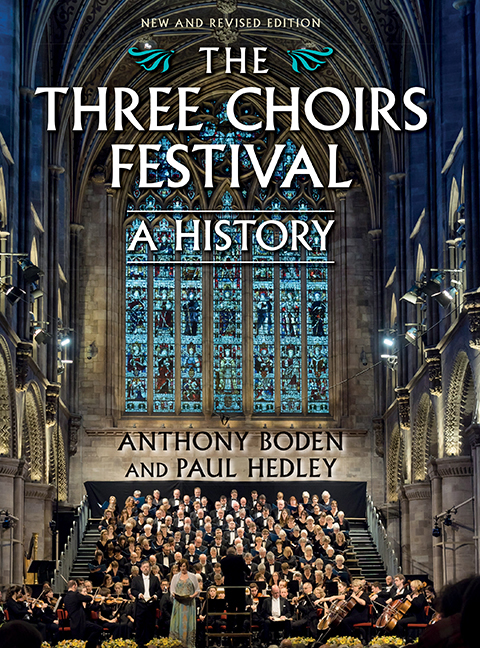Book contents
- Frontmatter
- Contents
- List of Illustrations
- Preface
- Acknowledgements
- List of Abbreviations
- List of Cathedral Organists
- 1 Origins
- 2 A Fortuitous and Friendly Proposal
- 3 A Numerous Appearance of Gentry
- 4 ‘The Musick of my Admiration Handel’
- 5 The Gentlemen and the Players
- 6 Avoiding Shipwreck
- 7 Prima voce
- 8 Favourites and Flops
- 9 Sacred and Profane
- 10 Froissart
- 11 The Unreasonable Man
- 12 The Dream
- 13 Beyond these Voices
- 14 An Essentially English Institution
- 15 The Elgar Festivals
- 16 Dona nobis pacem
- 17 Recovery
- 18 Association
- 19 A New Epoch
- 20 Jubilee
- 21 Theme with Variations
- 22 Houses of the Mind
- 23 ‘A Gold-Plated Orchestra’
- 24 A New Millennium
- 25 Reorganisation
- 26 An Invitation to the Palace
- Appendix Three Choirs Festival Timeline
- Select Bibliography
- Index
- Plate section
25 - Reorganisation
Published online by Cambridge University Press: 11 August 2017
- Frontmatter
- Contents
- List of Illustrations
- Preface
- Acknowledgements
- List of Abbreviations
- List of Cathedral Organists
- 1 Origins
- 2 A Fortuitous and Friendly Proposal
- 3 A Numerous Appearance of Gentry
- 4 ‘The Musick of my Admiration Handel’
- 5 The Gentlemen and the Players
- 6 Avoiding Shipwreck
- 7 Prima voce
- 8 Favourites and Flops
- 9 Sacred and Profane
- 10 Froissart
- 11 The Unreasonable Man
- 12 The Dream
- 13 Beyond these Voices
- 14 An Essentially English Institution
- 15 The Elgar Festivals
- 16 Dona nobis pacem
- 17 Recovery
- 18 Association
- 19 A New Epoch
- 20 Jubilee
- 21 Theme with Variations
- 22 Houses of the Mind
- 23 ‘A Gold-Plated Orchestra’
- 24 A New Millennium
- 25 Reorganisation
- 26 An Invitation to the Palace
- Appendix Three Choirs Festival Timeline
- Select Bibliography
- Index
- Plate section
Summary
THE organisational issues that had dogged Three Choirs over the previous decade, and which came to a head in 2005, resulted in increasing pressure, both from inside and out, to find a model on which the Festival could move forwards. Over the course of the 2006–7 cycle, much work had been going on behind the scenes to assess possible solutions, all of which became focused on recruiting some sort of central manager to work across the three cities. A job description was drawn up, and advertisements placed in the music and arts press, as well as the national papers. These attracted a varied field of applicants. The whole process was directly supported by the Arts Council, which, despite lauding many aspects of the 2005 Worcester Festival, was perhaps the loudest voice calling for organisational change. In particular, the Council gave a significant grant to assist the Festival with the appointee's first year's salary. The successful candidate would be the first full-time employee the Festival had ever taken on. The purpose of the role was advertised thus: ‘To establish and operate a central professional management system within the organisation leading to high quality delivery of Festivals.’ It also included a very clear responsibility regarding longerterm strategy and direction, and organisational development.
This was the Festival making a statement of intent about where it both needed and wanted to go in the future, and marked a recognition that the time had come for a professional core to assist local committees, and to provide key consistency and services to the local teams in the three cities. It was a huge shift. To use the words of Bernard Day, chairman of the Three Choirs Festival Association, in the published press release: ‘the new structure enables this historic festival to meet the challenges and opportunities of the 21st century. It will go from strength to strength.’
- Type
- Chapter
- Information
- The Three Choirs Festival: A HistoryNew and Revised Edition, pp. 389 - 429Publisher: Boydell & BrewerPrint publication year: 2017

